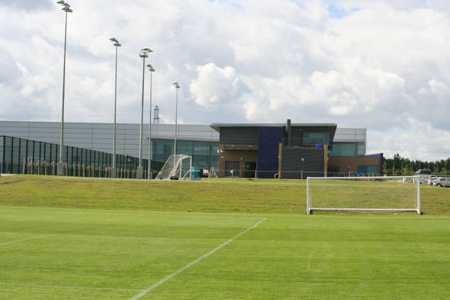Everton were the latest in a long line of clubs who approached Manchester United’s Head of Academy Nick Cox with a view to poaching him.
They were the first to be successful, according to this exclusive by the iPaper, and despite the strides made so far behind the scenes at Everton it still feels astonishing that the man who transformed United’s academy into one of the best in the world has been tempted by the new project at Everton.
Cox, who previously worked at Sheffield United where a young striker by the name of Dominic Calvert-Lewin was emerging, moved to Watford and then on to United, where a decade ago the famous academy was in disarray. The talent pool had dried up and the pathway to the first team was non existent.
Over the next few years Cox transformed the place. In his time 38 academy players have made their first team debuts, with the likes of Kobbie Mainoo and Alejandro Garnacho leading the side to a Youth Cup title. In a club that seems to run on dysfunction Cox’s leadership is the shining light of competence at Old Trafford.
Everton know that better than anybody. An impressive Everton u18s side finished 3rd in the table this season but despite a positive season the team was light years behind the two Manchester clubs. At u21 level the club qualified for the playoffs but was beaten 4-2 by United, while talents such as Emilio Lawrence have been poached from the club by the Manchester clubs for far too long.
1. A full time academy system
Farhad Moshiri did a lot of things wrong at Everton but one of the more damaging aspects of his reign was the move from full time to a hybrid academy system. It means players get fewer training minutes with coaches and recruitment is restricted to a smaller local area.
Upgrading to a full time system again would enable national recruitment and help convince talented academy youngsters such as 15-year-old sensation Jon Nsangou that their future lies at Everton.
During his time at Watford Cox implemented and oversaw the country’s first ever full time academy system.
He told Training Ground Guru: “It was the first-full time model in the country, in terms of a secondary school education, and that allowed us to develop players on a full-time basis from the ages of 12 to 16. The club also had an amazing commitment to opportunity and a business plan that said, ‘We will give players debuts’.
“The club faced administration and knew that developing young players was going to be a route to making sure we had a sustainable organisation.”
Going full time was something outgoing academy head Graeme Prosser was pushing for, alongside a proper place for academy training. It will also be top of Cox’s list.
2. Abolish teams below u11
It would be a drastic change and not one Everton would pursue straight away but Cox is an advocate of recruiting youngsters later to a professional club. It is a method Bayern Munich have switched to after they dropped all teams under the age of 11.
For Cox, this is because it is difficult to identify talent below that age.
He said: “Their journey is a long one. I like to think the Academy is part of an ecosystem and kids should bounce around various bits – their mates, their school, other sports, different levels of football. (At United) we like to go slow and steady and make the experiences the boys have with us to be childlike, appropriate and authentic.
“There is some quite significant research by (Arne) Güllich that looks across a variety of sports across the world and draws the conclusion that junior success is not really an accurate indicator of long term potential,” he says.
“When performers present themselves at a young age as being full of high potential, what we are actually seeing are the results of early practice, early maturation and maybe some physical advantages.”
While Everton have recently advertised for scouts to find players from the age of 5 a long term change to the academy could actually mean recruitment of youngsters comes at a much later age.
3. Progression to first team football
Cox’s philosophy is deeply embedded in player’s developing as people and reaching their potential – even if that means they move elsewhere to continue their careers. But that does not mean he is not an expert at developing players for the first team.
In his time at United a total of 38 players have made their first team debut. Garnacho and Mainoo are regulars, while Harry Amass and Toby Collyer are the latest talents off the conveyor belt.
The move matches that of the Friedkin’s ambition. The club is currently hiring a pathways expect coach to help players progress from u18 and u21 level to first team football. That appointment will be a key part of Cox’s team.
Despite extra resources now available, Cox’s philosophy is to keep the structure clean and lean to ensure players have the best chance of making it.
Cox told Training Ground Guru: “We have to create a world where it feels like we don’t have resource. Without resource, you become incredibly innovative and creative.
“If you want a humble environment for your players, it can’t be decadent; if you want a tight culture and clear communication you can’t have loads and loads of staff.
“I’m also a believer that opportunity is one of the top ingredients you need to develop young people.”
4. Better youth recruitment
Everton actually fare well when it comes to youth recruitment. Braiden Graham, signed last summer from Linfield, looks like he could be an astute signing. Justin Clarke, signed from Wimbledon, also looks like he has plenty of talent.
Will Tamen and Cieran Loney also arrived after making first team debuts at Burton and Partick Thistle respectively at young ages, while Jared Branthwaite is the poster boy for recruitment of under 18s that are ready-made for first team progression.
Cox does actively recruit at all levels for Manchester United. At youth level 17-year-old Amir Ibragimov was recruited from Sheffield United and there is plenty of buzz about the forward. At older ages Chido Obi has already broken into the first team at just 17 after he joined from Arsenal, while defender Ayden Heaven has also already made his first team debut after also arriving from the Gunners.
Everton have plenty of talent at u18 and u21 level but expect that to be bolstered by incomings. The club is already linked with Hearts defender John Dodds and Charlton youngster Reuben Gokah, and you can expect more incomings in the next few transfer windows.

